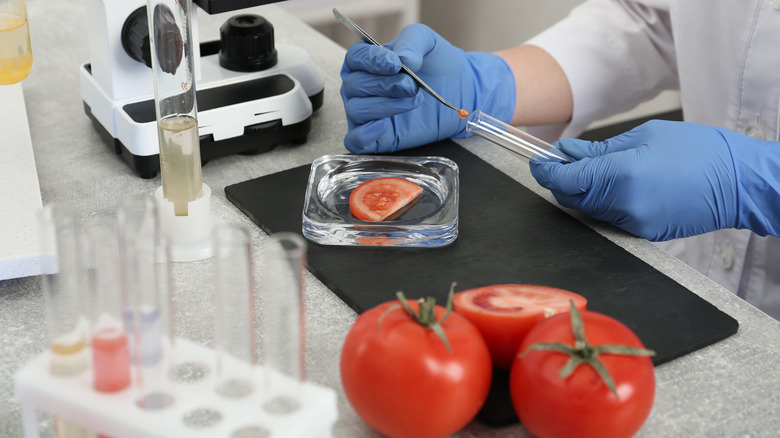Move Over Fish And Dairy! Tomatoes May Become The Next Best Source Of Vitamin D
Without adequate amounts of vitamin D, humans are more susceptible to various mental and physical health conditions, including depression, inflammation, cancer, dementia, and more, according to new research published in Nature Plants. Critical for immune system functioning and bone health, people worldwide are not getting enough of this essential vitamin.
Those who adhere to vegetarian and vegan diets face particular challenges when it comes to meeting the recommended daily intake for vitamin D (via Nature Plants), which stands at 600 international units (IU) for those ages 1 through 70, as per the Mayo Clinic. In lieu of fish and dairy, a new study conducted by researchers in England has found that gene-edited tomatoes have the potential to provide us with the same amounts of vitamin D3 as those found in 28 grams of tuna or two medium-sized eggs — all without altering the fruit's appearance or taste, reports CNN.
How researchers converted provitamin D3 into vitamin D3
Different from gene modification, gene editing involves removing a portion of plant DNA, rather than adding to it (per BBC). "It's like a pair of molecular tweezers, which you can use to precisely snip out a very small fragment of the gene to enhance a desirable trait in plants a lot quicker than [the] traditional breeding process, and without introducing any foreign DNA from other species," lead researcher of the study, Jie Li, tells The Guardian.
Provitamin D3 is found in the leaves of tomatoes but is naturally converted by the tomato into cholesterol (via CNN). By inhibiting the gene responsible for this conversion, researchers enabled a build-up of provitamin D3. The tomatoes were then sliced finely into pieces, according to Nature Plants. Once exposed to UVB light, the provitamin D3 in the leaves and tissues of the tomatoes were converted into what we consume as vitamin D3.
While the U.K. has authorized clinical trials of gene-edited crops (per CNN), it remains to be seen when such products would be available to the public, reports BBC. As per current government regulations, genetically modified or gene-edited crops must adhere to rigorous safety standards, which can take up to five years of assessment.


